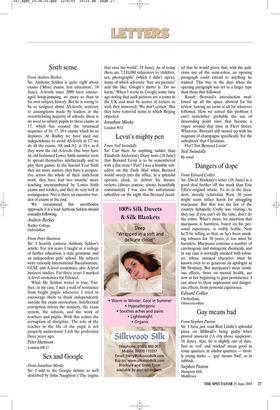Sixth sense
From Andrew Reekes
Sir: Anthony Seldon is quite right about exams (‘More exams, less education’, 18 June). A-levels since 2000 have encouraged hoop-jumping, no more so than in his own subject, history. But he is wrong to be so resigned about AS-levels; contrary to assumptions made by leaders in the overwhelming majority of schools, there is no need to submit pupils to these exams at 17, which has created the tyrannical sequence of 16, 17, 18+ exams which he so deplores. At Radley we have used our independence to avoid AS-levels at 17; we do all the exams, AS and A2, at 18+ as if they were the old A-levels. Our boys have an old-fashioned Lower Sixth summer term to spread themselves intellectually and to play their games. In the Second Year Sixth they are more mature, they have a perspective across the whole of their sixth-form work, they have had two months’ more teaching unencumbered by Lower Sixth exams and retakes, and they do very well in consequence. Nor is there an excessive burden of exams at the end.
We recommend this unorthodox approach; it is a lead Anthony Seldon should consider following.
Andrew Reekes Radley College, Oxfordshire
From Peter Harrison
Sir: I heartily endorse Anthony Seldon’s article. For ten years I taught at a college of further education, a state grammar, and an independent girls’ school. My subjects were variously International Baccalaureate, GCSE and A-level economics, also A-level business studies. For three years I marked A-level economics for Edexcel.
What Mr Seldon writes is true. Further, in my case, I met a wall of resistance from bright pupils whenever I tried to encourage them to think independently outside the exam curriculum. Intellectual corruption infests the ministry, the exam system, the schools, and the work of teachers and pupils. With this comes the corruption of discipline. The role of the teacher in the life of the pupil is not properly understood. I left the profession three years ago.
Peter Harrison London SW13


































































 Previous page
Previous page